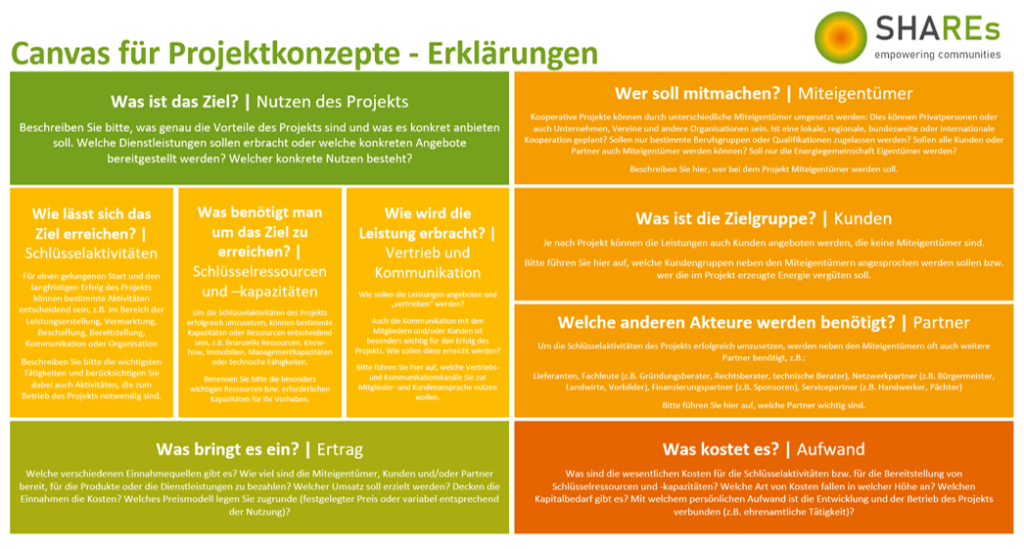To implement a successful project it is essential to define it and its scope as clearly and early as possible. A canvas model can help you to define your energy project. It consists of nine key questions and puts them in relation to each other.
1 Benefit of the project: What is the goal?
Describe the goal and the benefits of your energy project. What should it offer its members, clients or society as a whole? Which services does it offer and to whom?
If you need some inspiration, have a look at examples of existing energy communities. If you already know what you want to do and are looking for detailed information have a look at our project concepts.
2 How can you achieve this goal?
After the definition of the goal, you need to specify how and with which activities you can achieve this goal. These activities can include measures in the following fields: cooperation with service and equipment providers, procurement, marketing, deployment, communication, organisation, legislation and financing.
Describe the most important activities and next steps that are necessary to implement the project.
3 Key resources and capacities: What do you need to achieve the goal?
In order to successfully achieve the project’s goal, you should define what you need. This can include, for example, financial resources, expertise, land property, management capacity, or technical skills.
Name and describe the important resources or required capacities for your project. If you need help have a look at possible project concepts.
4 Marketing and communication: How do you reach members / customers?
Reach out to potential members/customers to convey what the project has to offer. Check out the target group profiles/types of members to see how to engage with them. Our communication activities show you how to implement communication efforts.
5 Co-owners: Who should participate?
There can be different types of members in your energy community. Define, who could become a co-owner in this project, for example:
- Energy community members
- Private individuals
- Municipalities
- Associations and other organisations
- Certain societal or professional groups
- The project’s customers
- The project’s partners
Define if your project should be local, regional, national or international.
6 Customers: Who is the main target group?
Depending on the project, the services provided can be also offered to consumers who are not co-owners.
Describe, which Target groups your project wants to address in addition to the co-owners.
7 Which external stakeholders do you need?
To successfully implement the key activities of the project, external partners are often needed in addition to the co-owners, such as:
- suppliers
- experts (start-up advisors, legal advisors, technical advisors)
- network stakeholders (mayors, politicians, role models),
- financing partners (sponsors, banks)
- service partners (craftsmen, tenants)
Identify which partners are important for your project.
8 What are the expected earnings?
Financing is always an important part of each project. Define which earnings are expected and for what they will be used:
- How much should the co-owners, consumer and/or partners pay to maintain the energy projects?
- Are they willing to pay that amount for the project services/products?
- What revenue is to be generated? Do the revenues cover the costs? What pricing model do you need (fixed price or variable according to usage)?
9 What are the expected costs?
Describe the expected costs and where the resources for covering the cost will come from.
- What are the main costs for the key activities or for the provision of key resources and capacities?
- What types of costs are incurred and in what amounts?
- What are the capital requirements?
- What personal effort is needed to develop and operate the project (e.g. volunteer time)?
The starting point for planning is an economically sound concept. Financing options also depend on it; many banks require a business plan, which describes the business model in detail and includes profitability calculations. If you need to found a new legal entity, check out the legal forms of energy communities and seek consultation with a professional consultant.

